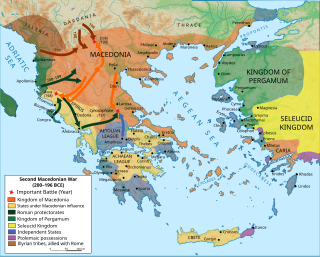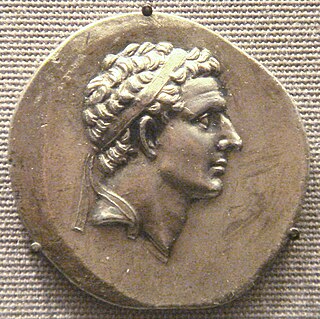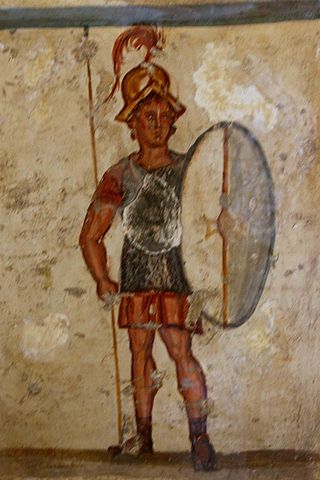Related Research Articles

Andriscus, also often referenced as Pseudo-Philip, was a Greek pretender who became the last independent king of Macedon in 149 BC as Philip VI, based on his claim of being Philip, a now-obscure son of the last legitimate Macedonian king, Perseus. His reign lasted just one year and was toppled by the Roman Republic during the Fourth Macedonian War.
This article concerns the period 169 BC – 160 BC.
This article concerns the period 179 BC – 170 BC.
This article concerns the period 189 BC – 180 BC.
This article concerns the period 199 BC – 190 BC.
Year 150 BC was a year of the pre-Julian Roman calendar. At the time it was known as the Year of the Consulship of Flamininus and Balbus. The denomination 150 BC for this year has been used since the early medieval period, when the Anno Domini calendar era became the prevalent method in Europe for naming years.
Year 197 BC was a year of the pre-Julian Roman calendar. At the time it was known as the Year of the Consulship of Cethegus and Rufus. The denomination 197 BC for this year has been used since the early medieval period, when the Anno Domini calendar era became the prevalent method in Europe for naming years.
Year 180 BC was a year of the pre-Julian Roman calendar. At the time it was known as the Year of the Consulship of Luscus and Piso/Flaccus. The denomination 180 BC for this year has been used since the early medieval period, when the Anno Domini calendar era became the prevalent method in Europe for naming years.

Perseus was the last king (Basileus) of the Antigonid dynasty, who ruled the successor state in Macedon created upon the death of Alexander the Great. He was the last Antigonid to rule Macedon, after losing the Battle of Pydna on 22 June 168 BC; subsequently, Macedon came under Roman rule.

Philip V was king (Basileus) of Macedonia from 221 to 179 BC. Philip's reign was principally marked by the Social War in Greece and a struggle with the emerging power of the Roman Republic. He would lead Macedon against Rome in the First and Second Macedonian Wars, losing the latter but allying with Rome in the Roman-Seleucid War against Antiochus III of the Seleucids. He died in 179 BC from illness after efforts to recover the military and economic condition of Macedonia and passed the throne onto his elder son, Perseus of Macedon.

The Second Macedonian War was fought between Macedon, led by Philip V of Macedon, and Rome, allied with Pergamon and Rhodes. Philip was defeated and was forced to abandon all possessions in southern Greece, Thrace and Asia Minor. During their intervention, although the Romans declared the "freedom of the Greeks" against the rule from the Macedonian kingdom, the war marked a significant stage in increasing Roman intervention in the affairs of the eastern Mediterranean, which would eventually lead to Rome's conquest of the entire region.

Titus Quinctius Flamininus was a Roman politician and general instrumental in the Roman conquest of Greece.

Hellenistic Greece is the historical period of the country following Classical Greece, between the death of Alexander the Great in 323 BC and the annexation of the classical Greek Achaean League heartlands by the Roman Republic. This culminated at the Battle of Corinth in 146 BC, a crushing Roman victory in the Peloponnese that led to the destruction of Corinth and ushered in the period of Roman Greece. Hellenistic Greece's definitive end was with the Battle of Actium in 31 BC, when the future emperor Augustus defeated Greek Ptolemaic queen Cleopatra VII and Mark Antony, the next year taking over Alexandria, the last great center of Hellenistic Greece.
The Illyro-Roman Wars were a series of wars fought between the Roman Republic and the Ardiaei kingdom. In the First Illyrian War, which lasted from 229 BC to 228 BC, Rome's concern was that the trade across the Adriatic Sea increased after the First Punic War at a time when Ardiaei power increased under queen Teuta. Attacks on trading vessels of Rome's Italic allies by Illyrian pirates and the death of a Roman envoy named Coruncanius on Teuta's orders, prompted the Roman senate to dispatch a Roman army under the command of the consuls Lucius Postumius Albinus and Gnaeus Fulvius Centumalus. Rome expelled Illyrian garrisons from a number of Greek cities including Epidamnus, Apollonia, Corcyra, Pharos and established a protectorate over these Greek towns. The Romans also set up Demetrius of Pharos as a power in Illyria to counterbalance the power of Teuta.
Demetrius the Fair or the Handsome, known in modern ancient historical sources as Demetrius of Cyrene, was a Hellenistic king of Cyrene, who succeeded Magas I.

Orophernes Nicephorus was one of the two sons Antiochis pretended to have had with Ariarathes IV, the king of Cappadocia because she failed to have children. However, she then did bear a child, Mithridates, and told her husband about the fake sons. These were sent to Rome and Ionia respectively to avoid a succession dispute with the legitimate son, whose name was changed to Ariarathes and who succeeded his father as Ariarathes V in 163 BC. A few years later Orophernes deposed him with the help of Demetrius I Soter, who became the king of the Syria-based Seleucid Empire in 161 BC when he overthrew Antiochus V, an underage king, and his regent, Lysias. The reign of Orophernes was short-lived. The Romans restored Ariarathes V.
Lucius Quinctius Flamininus was a Roman politician and general who served as consul in 192 BC alongside Gnaeus Domitius Ahenobarbus. He was eventually expelled from the Senate by Cato the Elder.
Charops or Charopus is the name of two statesmen in 2nd century BC of the Epirote League, grandfather and grandson; both of them had the patronymic Machatas.

The Antigonid Macedonian army was the army that evolved from the ancient Greek kingdom of Macedonia in the period when it was ruled by the Antigonid dynasty from 276 BC to 168 BC. It was seen as one of the principal Hellenistic fighting forces until its ultimate defeat at Roman hands at the Battle of Pydna in 168 BC. However, there was a brief resurgence in 150-148 during the revolt of Andriscus, a supposed heir to Perseus.

Laodice V was a Seleucid princess. Through marriage to Perseus king of Macedon she was a Queen of the ruling Antigonid dynasty in Macedonia and possibly later of the Seleucid dynasty.
References
- ↑ Livius. xxxix. 53
 This article incorporates text from a publication now in the public domain : Smith, William, ed. (1870). Dictionary of Greek and Roman Biography and Mythology .
This article incorporates text from a publication now in the public domain : Smith, William, ed. (1870). Dictionary of Greek and Roman Biography and Mythology .{{cite encyclopedia}}: Missing or empty|title=(help)